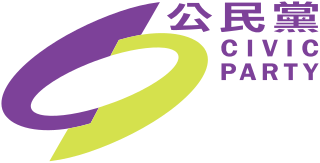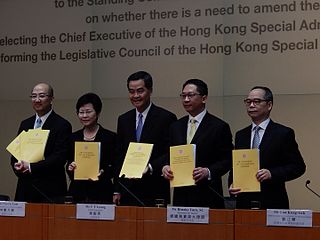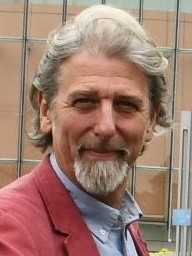
The chief executiveof the Hong Kong Special Administrative Region is the representative of the Hong Kong Special Administrative Region and head of the Government of Hong Kong.

Elections in Hong Kong take place when certain political offices in the government need to be filled. Hong Kong has a multi-party system, with numerous parties in the Legislative Council. The Chief Executive of Hong Kong is nonpartisan but can work with several parties to form a coalition government.

The Election Committee is the electoral college in Hong Kong that selects the Chief Executive (CE) and, since 2021, elects 40 of the 90 members of the Legislative Council. Established by Annex I of the Basic Law of Hong Kong which states that "the Chief Executive shall be elected by a broadly representative Election Committee in accordance with this Law and appointed by the Central People's Government ." It is formed and performs its selection function once every five years, even in the event of a CE not completing their term. The membership of the Election Committee was expanded to 1,500 under the massive overhaul of the electoral system in 2021. The Election Committee has been criticised for its "small-circle" electoral basis and its composition favouring pro-Beijing and business interests.

The 2005 Hong Kong Chief Executive election was held to fill the vacancy of the territory's top office. Then Chief Executive Tung Chee-hwa submitted his resignation to the central government in Beijing, and was officially approved on 12 March. As Donald Tsang, Chief Secretary for Administration in Tung's cabinet, was the only candidate, he was declared elected unopposed on 16 June. Tsang took office on 21 June to begin his first two-year term.

The Civic Party (CP) was a pro-democracy liberal political party from March 2006 to May 2023 in Hong Kong.

The 2007 Hong Kong Chief Executive election was held on 25 March 2007 to select the Chief Executive of Hong Kong. Incumbent Chief Executive Donald Tsang was re-elected, defeating the pro-democracy challenger, legislator Alan Leong of the Civic Party by 649 to 123 votes in the 796-member Election Committee dominated by the pro-Beijing electors.

The 2011 Hong Kong District Council elections were held on 6 November 2011. Elections were held to all 18 District Councils of Hong Kong, returning 412 members from directly elected constituencies, each selecting a council member. After the government's constitutional reform package was passed in 2010, five new seats in the Legislative Council would be created in which the candidates would be nominated by all District Councillors.

The 2011 Election Committee subsector elections took place between 7:30 am and 10:30 pm on 11 December 2011. The Election Committee sub-sector elections are a part of the contemporary political process of Hong Kong. The election's purpose is to decide the 1,044 members of the Election Committee of Hong Kong. The resulting Election Committee is then responsible for electing the Chief Executive of Hong Kong Special Administrative Region (SAR) in the 2012 Election.

The 2017 Hong Kong Chief Executive election was held on 26 March 2017 for the 5th term of the Chief Executive of Hong Kong (CE), the highest office of the Hong Kong Special Administrative Region (HKSAR). Former Chief Secretary for Administration Carrie Lam beat former Financial Secretary John Tsang and retired judge Woo Kwok-hing, receiving 777 votes from the 1,194-member Election Committee.

The 2000 Election Committee subsector elections were held on 9 July 2000 to elect 664 members of Election Committee. The Election Committee was responsible for electing the Legislative Council members of the Election Committee constituency, as well as the Chief Executive of Hong Kong in the following 2002 Chief Executive election.

The 1998 Election Committee subsector elections were held on 2 April 1998 to form the Election Committee responsible for electing the Chief Executive of Hong Kong as well as 10 seats of the Election Committee constituency in the first Legislative Council election in May 1998. The 800-member Election Committee was formed, consisting of 77 ex-officio members; 40 members nominated by the Religious Subsector; 95 returned uncontested from four subsectors; and 588 returned from 31 subsectors after the subsector elections.
The 2005 Election Committee subsector by-elections were held on 1 May 2005 to fill the 33 vacancies in 17 subsectors of the Election Committee for electing the Hong Kong Chief Executive in the Chief Executive election in following March.

The 2014–2015 Hong Kong electoral reform was a proposed reform for the 2017 Hong Kong Chief Executive election and 2016 Legislative Council election.

The 2016 Election Committee subsector elections were held on 11 December 2016 for 1,034 of the 1,200 members of the Election Committee (EC) which is responsible for electing the Chief Executive of Hong Kong (CE) in the 2017 election.

Paulus Johannes Zimmerman, better known as Paul Zimmerman, is a Dutch-born Hong Kong environmentalist, politician and businessman. He is a former member of the Southern District Council for Pokfulam and CEO of Designing Hong Kong, a group that advocates better urban design.

Edward Lau Kwok-fan, MH, JP is a Hong Kong politician. He is the member of the executive committee of the Democratic Alliance for the Betterment and Progress of Hong Kong (DAB) and former member of the North District Council, representing Yan Shing until 2019. In the 2016 Hong Kong Legislative Council election, he succeeded DAB veteran legislator Ip Kwok-him in the District Council (First) functional constituency to the Legislative Council of Hong Kong.

Ken Tsang Kin-chiu is a Hong Kong activist and social worker. He is most known for his beating incident during the 2014 Hong Kong protests.

The 2021 Hong Kong electoral changes were initiated by the National People's Congress (NPC) on 11 March 2021 to "amend electoral rules and improve the electoral system" of the Hong Kong Special Administrative Region (HKSAR) for its Chief Executive (CE) and the Legislative Council (LegCo), in order to ensure a system in which only "patriots", according to the Chinese definition, govern Hong Kong. The reforms have been widely criticized for their negative impact on the democratic representation in the Hong Kong legislature.

The 2021 Election Committee subsector elections were held on 19 September 2021 for elected seats of the 1,500 members of the Election Committee (EC) which is responsible for electing 40 of the 90 seats in the Legislative Council (LegCo) in the 2021 election and the Chief Executive of Hong Kong (CE) in the 2022 election.

Michael Lee Chun-keung is a Hong Kong engineer and politician. Currently serving as the vice-chairperson of Liberal Party, he was elected as a member of Legislative Council for the Election Committee constituency heavily skewed the pro-Beijing camp.
















